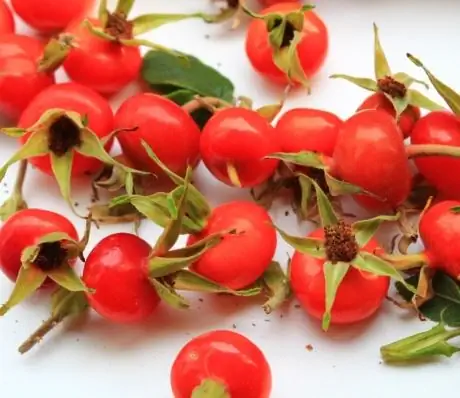- Author Rachel Wainwright wainwright@abchealthonline.com.
- Public 2023-12-15 07:39.
- Last modified 2025-11-02 20:14.
Kumquat
Kumquat is an exotic orange-colored citrus fruit from the subgenus Fortunella, reminiscent of a small orange. Kumquat fruits have an elongated shape 3-5 cm long, 2-4 cm wide. In nature, there are several varieties of kumquat, differing in the shape of the fruit. The plant rarely propagates by seed, since it has a weak root system. In Japan and China, the kumquat is grown from the three-leaf poncirus by grafting. Also, kumquat is cultivated in Southeast Asia, the Middle East, the southern United States and southern Europe.
The ratio of BJU in the product

Source: depositphotos.com How to burn 71 kcal?
| Walking | 18 minutes |
| Jogging | 8 minutes |
| Swimming | 6 minutes |
| A bike | 10 min. |
| Aerobics | 14 minutes |
| Household chores | 24 minutes |
The taste of kumquat is similar to tangerine, but, unlike it, it is edible with the peel. Its fruit has a certain peculiarity, according to which the rind of the kumquat is thin and sweet, and the core, on the contrary, with some sourness.
Currently, there are six main types of kumquat:
- Hong Kong Kumquat;
- Malay Kumquat;
- Marumi Kumquat;
- Meiva Kumquat;
- Nagami Kumquat;
- Fukushi Kumquat.
Benefits of kumquat
Kumquat fruits contain an impressive amount of nutrients: vitamins A, B, C, E, P, trace elements and minerals, which include copper, calcium, potassium, zinc, sodium, iron, phosphorus. In addition, kumquat is full of pectin and essential substances that help restore immunity, protecting the body from colds and viral diseases. Eating the fruit along with the peel will help you defeat infectious and fungal diseases.
The benefits of kumquat are also due to its antioxidant effect: citrus successfully cleanses the body of toxins and toxins. In addition, the fruit itself never contains nitrates, which is explained by the presence of citric acid in its composition.
The beneficial properties of kumquat are based on the normalization of the gastrointestinal tract: in dried form, it perfectly restores metabolism, being a prophylactic agent against gastric ulcer and duodenal ulcer.
Regular consumption of kumquat prevents the development of arthrosis and arthritis, cancer, normalizes heart rate and blood pressure, strengthens ligaments and muscles, accelerates tissue repair, and also reduces the risk of diabetes.
Remarkable is the ability of kumquat to protect our body from the harmful effects of stress: just a few fruits can reduce the fatigue and tension accumulated during the day. In China, it is customary to get rid of hangover with the help of this orange fruit after happy holidays.
Calorie content of kumquat
The calorie content of kumquat is 71 kcal / 100 grams of fruit. The nutritional value:
- Proteins - 1.88 g;
- Fat - 0.86 g;
- Carbohydrates - 9.4 g.
The low calorie content of kumquat allows the fruit to be considered a dietary product. It is enough to eat 8-10 kumquat fruits to satisfy the body's need for healthy fiber by more than half of the daily requirement.

Kumquat application
Fresh, this small fruit, cut into slices, can become a decoration for any table. It is used both as an independent product and as an ingredient for fruit salads.
Kumquat fruits are used to make sweet and sour sauces, which are served with meat, fish or vegetable dishes. This citrus goes especially well with pork and chicken meat, giving the dish a refreshing taste.
Kumquat is also ideal for desserts. It is often used to make candied fruits, jams, preserves, juices, yoghurts. The exotic sourness makes the kumquat an excellent snack for strong drinks such as cognac or whiskey.
YouTube video related to the article:
Found a mistake in the text? Select it and press Ctrl + Enter.






